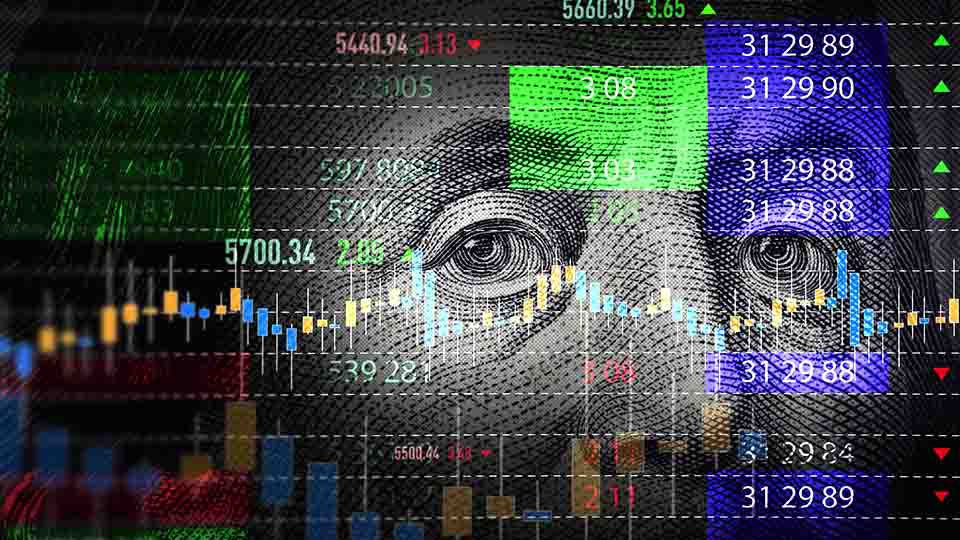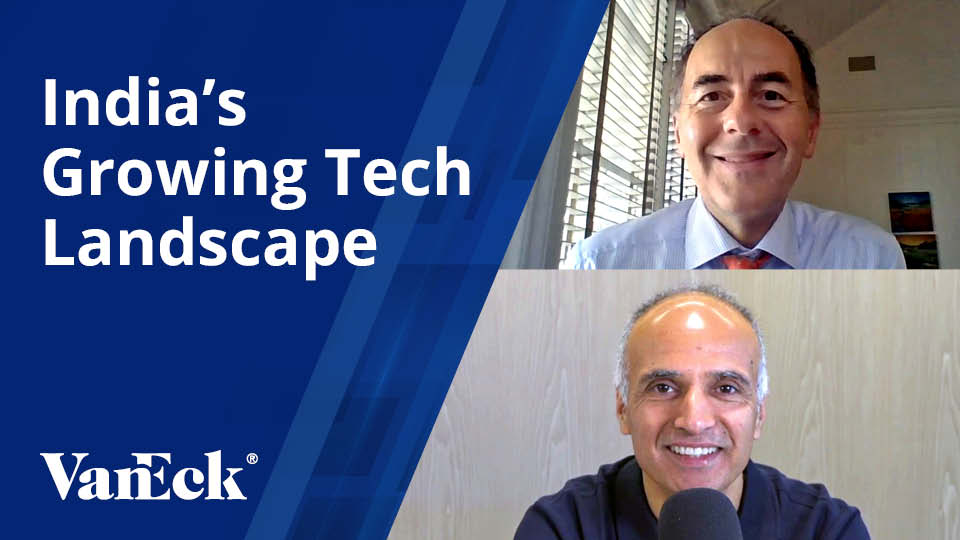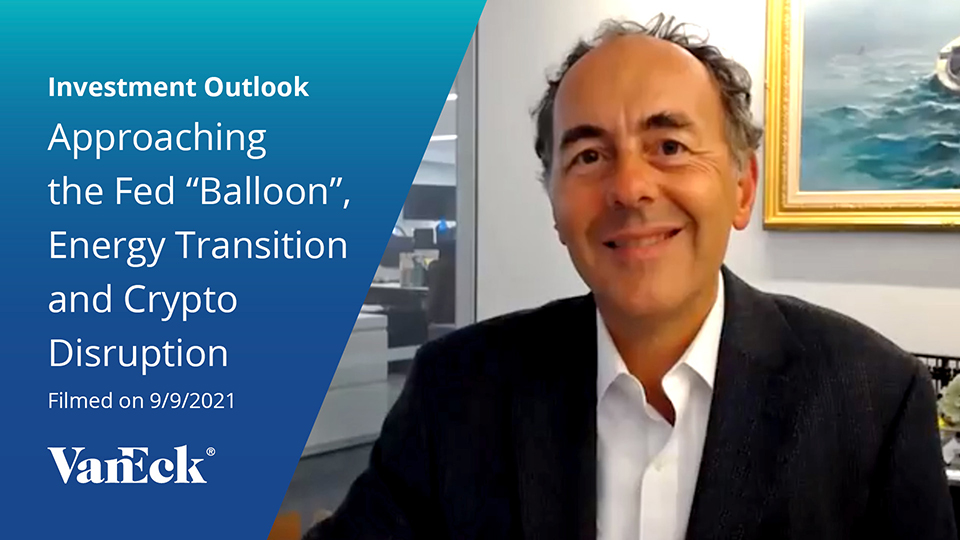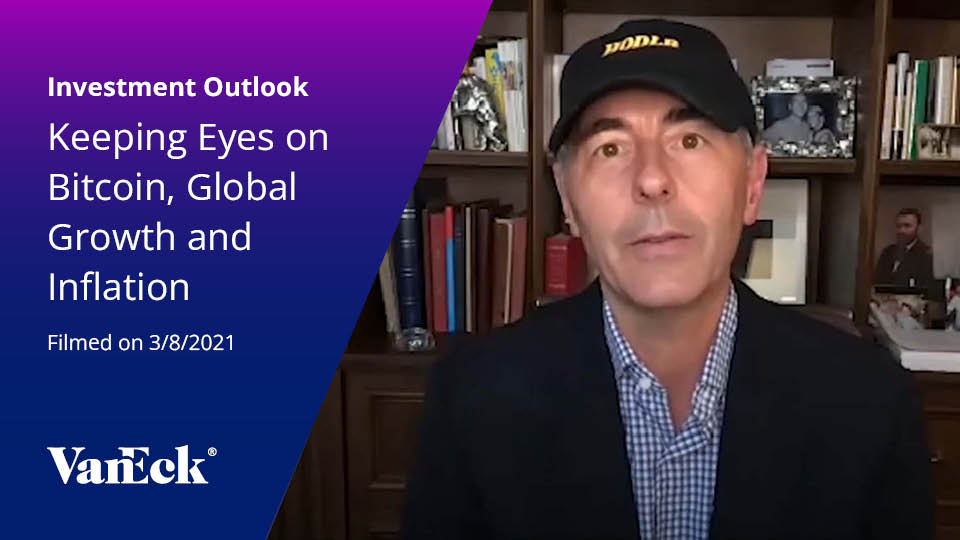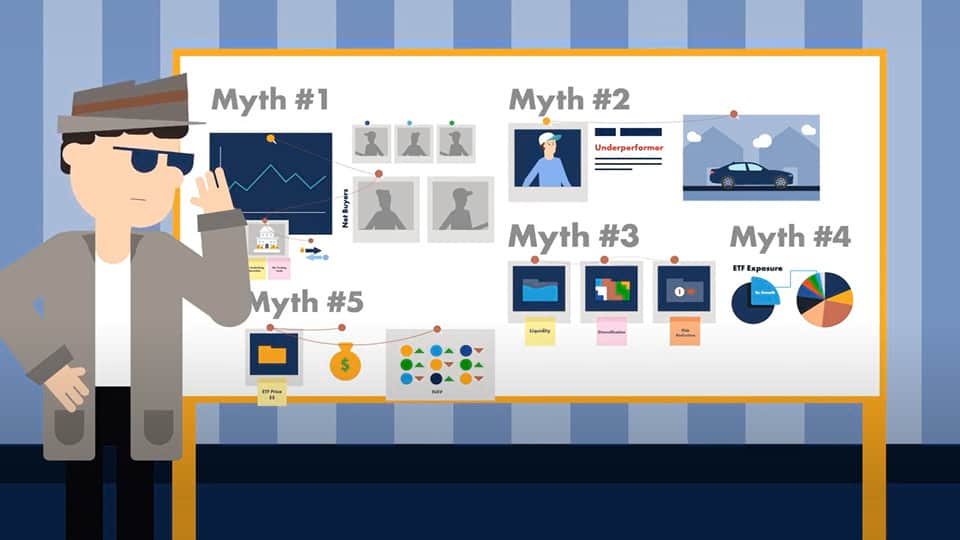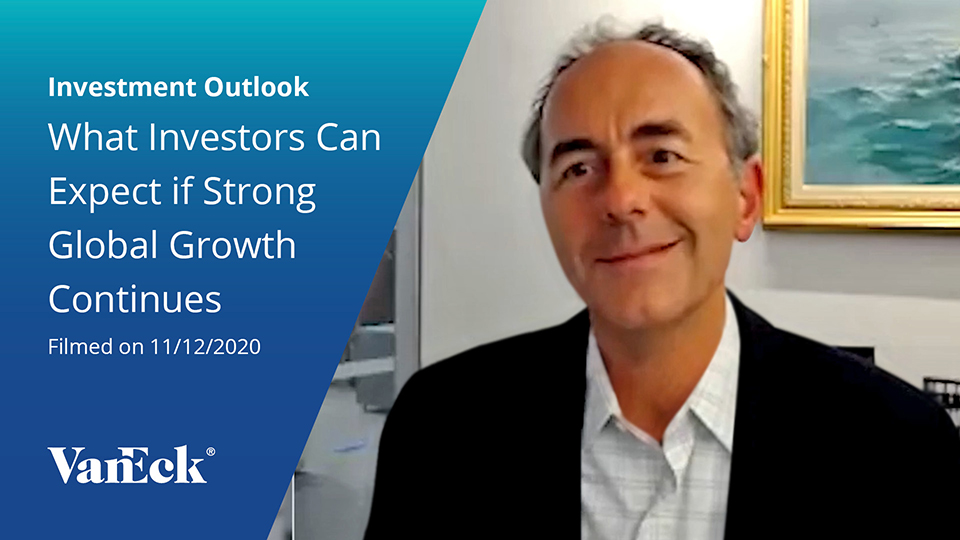Commodities Rock as Related Investments Remain Attractive
30 December 2021
Watch Time 9:28 MIN
Jenna Dagenhart: Joining us now with his 2022 outlook and top themes to watch for investors as we head into the New Year is VanEck CEO Jan van Eck. Jan, it's great to have you back with us, and it's hard to believe 2021 is coming to an end. And at the beginning of the year, you were already saying it was time for the inflation trade; since then, it's only gotten harder for anyone to say inflation is transitory. What are your current views on inflation and what investors can expect in 2022?
Jan van Eck: Jen, it's good to see you. Listen, I think there's two things: there's reality, and then there's the market reaction to reality. So, let's talk about reality first. The world economy came into 2021 like a car going 200 miles an hour. It was fueled by the biggest stimulus we'd gotten since World War II. So the only question was, were we going to be able to slow down in a reasonable pace without crashing? Or was something bad going to happen? I don't think we know the inflation answer and we won't know until the second half of last year [2020], next year [2022], sorry. Let me just explain that for a second. First of all, last year we were thinking about inflation and the technologists were saying, "Oh, we live in a deflationary world because there's all this technology. And who needs people for jobs when there's all this technology?"
Jan van Eck: And I think we realized that that's not really the case. With COVID, let's just take, for example, we've got great technology, we've got the vaccines, we've got all this testing, but there's a lot of jobs associated with that particular activity. So, when I look at inflation, I think of wages and we really won't know until the second half of 2022, so that's the reality portion. I will say that right now, the market is dealing with the uncertainty of this, and it doesn't like uncertainty. But I think we can go into 2022 with this cautious outlook that we won't, unfortunately, know the answer about inflation until the second half of next year.
Jenna Dagenhart: And the Fed will also be monitoring wages very closely. Looking at monetary policy, Jan, as the Fed dials back its stimulus and forecasts three rate hikes in 2022, how do you expect the market to react and how can investors prepare their portfolios?
Jan van Eck: Well, unfortunately, the Fed is sort of the cause of the uncertainty and, like I said before, markets really don't like uncertainty. We've got several causes of uncertainty. We've got China, which their economy is really slowed down, so will they stimulate enough in 2022 to make sure that they're going to keep being a driver of global growth? The Fed is also the other part of uncertainty and that's what has investors really nervous. For our car that's slowing down, investors are asking, is the Fed going to hit breaks too hard? What is it like to raise interest rates and reduce the stimulus, increase the tapering? The punch bowl - they're taking away a punch bowl that's never been as big, and, arguably, they haven't really taken the punch bowl away since the global financial crisis, maybe 2018 aside.
Jan van Eck: So there's uncertainty, the investors, don't like the uncertainty around Fed action and inflation. Now having said all that, I think the markets are really correcting. There's a lot of damage done to stocks underneath it, the top index of the S&P 500. So short-term, I'm looking for this to continue, but then maybe we have an upside January surprise because I really don't think the Fed wants to put the brakes on too hard. And if the market really starts seizing up on itself, I think suddenly you'll have some positive Fed statements and the markets will stage a relief for rally. So, I know that's a little complicated, but we have to work through some of this uncertainty and I'm optimistic, kind of, earlier in the year.
Jenna Dagenhart: Per your analogy about hitting the brakes too hard, too, with a bicycle, you'll flip over if you do that too quickly.
Jan van Eck: Exactly.
Jenna Dagenhart: And now looking at some of the top performers here, Jan, energy and crypto have been two of the best performing assets in 2021. What have been the key drivers for this and will this continue in 2022?
Jan van Eck: Right. Well, as this kind of fourth quarter started, what we were saying to investors is, listen, the market's pretty extended, but start thinking about multi-year investment trends and take your opportunities as they present themselves. So, one is the disruption that's happening through blockchain and crypto, which we've been talking about for a while. The issue is that growth investments were really richly valued. And so, what we said is dollar-cost average in. On the extreme side, the other side was energy investments, resource equities in particular, which we were very excited about. But on the other side, we've been through a 10-year bear market in commodities, and every time you wanted to buy commodities, except for maybe the last six months, there was some correction and you got penalized. And again, our sort of feeling is dollar-cost average. There is a lot of demand for ESG friendly resources, and we don't see that going away despite the recent setback of the Build Back Better program, which had a lot of climate spending in it. So still focus on those trends. They're kind of hard to invest in, so dollar-cost average over time. Don't do it all at once.
Jenna Dagenhart: You've called 2021 the year of smart contracts. How is this space evolving and what'll be the focus in 2022?
Jan van Eck: Right. So smart contracts in the world of the blockchain are the kind of base level, let's call it the database software on which other applications are functioning. So, whether it's NFTs or decentralized financial applications, borrowing and lending, payments in the crypto system, they all choose one database technology or another. Ethereum is the most famous. Solana has performed really well this year. That category of digital asset tokens has been the best performing this year. To oversimplify, Ethereum has outperformed Bitcoin and every other major, significant investment. I actually think that will continue next year. That is where you're seeing trillions of dollars of economic activity, millions of transactions on these smart contract databases. And we just think that that use will continue and that will translate through to prices as well. We think that's kind of accessing the blockchain and that's the space that we're most interested as a firm.
Jenna Dagenhart: Finally, Jan, before I let you go, we're coming up on a rare, but quiet week for the markets. What should we be reading on our holiday break?
Jan van Eck: Well, my favorite read really over the year, and I've talked about a lot, is Bill Gates' book on climate change. I think it just... I read it over the summer. I like to say it's at the high school level, which is perfect for me. You can really get lost in a lot of the data and a lot of the assumptions and the discussion of climate change. But my takeaways, I just think, are really, really important for investors when they're considering ESG and their portfolio in general, which is how are we going to get to a net neutral carbon world? And I just don't think it's going to be through spending more on existing technologies. We really need, like happened with COVID, breakthrough technologies and the private sector to really commercialize those and popularize them so that they ultimately have a cost advantage, sort of what Elon Musk has done with the Tesla cheaper version. So anyway, that's my favorite read. And, I guess, I finally got around to Ted Lasso this fall, which was kind of a happy show, which is always good during the holidays.
Jenna Dagenhart: Yeah. Well, happy holidays, Jan, and great to have you.
Jan van Eck: Thanks, Jen. Happy New Year to you.
Jenna Dagenhart: And thank you to everyone watching. Once again, that was VanEck CEO Jan van Eck. To receive regular updates from VanEck's experts, please visit vaneck.com/subscribe.
IMPORTANT DISCLOSURE
Please note that VanEck may offer investments products that invest in the asset class(es) or industries included in this video.
The views and opinions expressed are those of the speaker but not necessarily those of VanEck and are current as of the video’s posting date. Video commentaries are general in nature and should not be construed as investment advice.
This material has been prepared for informational purposes only and is not an offer to buy or sell or a solicitation of any offer to buy or sell any security/financial instrument, or to participate in any trading strategy.
Certain statements contained herein may constitute projections, forecasts and other forward looking statements, which do not reflect actual results, are valid as of the date of this communication and subject to change without notice. Information provided by third party sources are believed to be reliable and have not been independently verified for accuracy or completeness and cannot be guaranteed. VanEck does not guarantee the accuracy of third party data. References to specific securities and their issuers or sectors are for illustrative purposes only.
Information provided by Van Eck is not intended to be, nor should it be construed as financial, tax or legal advice. It is not a recommendation to buy or sell an interest in cryptocurrencies.
All investing is subject to risk, including the possible loss of the money you invest. As with any investment strategy, there is no guarantee that investment objectives will be met and investors may lose money. Diversification does not ensure a profit or protect against a loss in a declining market. Past performance is no guarantee of future performance.
The S&P 500 Index is a product of S&P Dow Jones Indices LLC and/or its affiliates and has been licensed for use by Van Eck Associates Corporation. Copyright © 2021 S&P Dow Jones Indices LLC, a division of S&P Global, Inc., and/or its affiliates. All rights reserved. Redistribution or reproduction in whole or in part are prohibited without written permission of S&P Dow Jones Indices LLC. For more information on any of S&P Dow Jones Indices LLC’s indices please visit www.spdji.com. S&P® is a registered trademark of S&P Global and Dow Jones® is a registered trademark of Dow Jones Trademark Holdings LLC. Neither S&P Dow Jones Indices LLC, Dow Jones Trademark Holdings LLC, their affiliates nor their third party licensors make any representation or warranty, express or implied, as to the ability of any index to accurately represent the asset class or market sector that it purports to represent and neither S&P Dow Jones Indices LLC, Dow Jones Trademark Holdings LLC, their affiliates nor their third party licensors shall have any liability for any errors, omissions, or interruptions of any index or the data included therein.
Cryptocurrency is a digital representation of value that functions as a medium of exchange, a unit of account, or a store of value, but it does not have legal tender status. Cryptocurrencies are sometimes exchanged for U.S. dollars or other currencies around the world, but they are not generally backed or supported by any government or central bank. Their value is completely derived by market forces of supply and demand, and they are more volatile than traditional currencies. The value of cryptocurrency may be derived from the continued willingness of market participants to exchange fiat currency for cryptocurrency, which may result in the potential for permanent and total loss of value of a particular cryptocurrency should the market for that cryptocurrency disappear. Cryptocurrencies are not covered by either FDIC or SIPC insurance. Legislative and regulatory changes or actions at the state, federal, or international level may adversely affect the use, transfer, exchange, and value of cryptocurrency.
Investing in cryptocurrencies comes with a number of risks, including volatile market price swings or flash crashes, market manipulation, and cybersecurity risks. In addition, cryptocurrency markets and exchanges are not regulated with the same controls or customer protections available in equity, option, futures, or foreign exchange investing. There is no assurance that a person who accepts a cryptocurrency as payment today will continue to do so in the future.
Investors should conduct extensive research into the legitimacy of each individual cryptocurrency, including its platform, before investing. The features, functions, characteristics, operation, use and other properties of the specific cryptocurrency may be complex, technical, or difficult to understand or evaluate. The cryptocurrency may be vulnerable to attacks on the security, integrity or operation, including attacks using computing power sufficient to overwhelm the normal operation of the cryptocurrency’s blockchain or other underlying technology. Some cryptocurrency transactions will be deemed to be made when recorded on a public ledger, which is not necessarily the date or time that a transaction may have been initiated.
- Investors must have the financial ability, sophistication and willingness to bear the risks of an investment and a potential total loss of their entire investment in cryptocurrency.
- An investment in cryptocurrency is not suitable or desirable for all investors.
- Cryptocurrency has limited operating history or performance.
- Fees and expenses associated with a cryptocurrency investment may be substantial.
There may be risks posed by the lack of regulation for cryptocurrencies and any future regulatory developments could affect the viability and expansion of the use of cryptocurrencies. Investors should conduct extensive research before investing in cryptocurrencies.
Information provided by Van Eck is not intended to be, nor should it be construed as financial, tax or legal advice. It is not a recommendation to buy or sell an interest in cryptocurrencies.
ESG investing is qualitative and subjective by nature, and there is no guarantee that the factors utilized by VanEck or any judgment exercised by VanEck will reflect the opinions of any particular investor. Information regarding responsible practices is obtained through voluntary or third-party reporting, which may not be accurate or complete, and VanEck is dependent on such information to evaluate a company’s commitment to, or implementation of, responsible practices. Socially responsible norms differ by region. There is no assurance that the socially responsible investing strategy and techniques employed will be successful.
No part of this material may be reproduced in any form, or referred to in any other publication, without express written permission of Van Eck Associates Corporation.
© Van Eck Associates Corporation.
Van Eck Associates Corporation
666 Third Avenue, New York, NY 10017
Related Insights
IMPORTANT DEFINITIONS & DISCLOSURES
This material may only be used outside of the United States.
This is not an offer to buy or sell, or a recommendation of any offer to buy or sell any of the securities mentioned herein. Fund holdings will vary. For a complete list of holdings in VanEck Mutual Funds and VanEck ETFs, please visit our website at www.vaneck.com.
The information presented does not involve the rendering of personalized investment, financial, legal, or tax advice. Certain statements contained herein may constitute projections, forecasts and other forward looking statements, which do not reflect actual results. Information provided by third-party sources are believed to be reliable and have not been independently verified for accuracy or completeness and cannot be guaranteed. Any opinions, projections, forecasts, and forward-looking statements presented herein are valid as of the date of this communication and are subject to change without notice. The information herein represents the opinion of the author(s), but not necessarily those of VanEck.
The views contained herein are not to be taken as advice or a recommendation to buy or sell any investment in any jurisdiction, nor is it a commitment from Van Eck Associates Corporation or its subsidiaries to participate in any transactions in any companies mentioned herein. This content is published in the United States. Investors are subject to securities and tax regulations within their applicable jurisdictions that are not addressed herein.
All investing is subject to risk, including the possible loss of the money you invest. As with any investment strategy, there is no guarantee that investment objectives will be met and investors may lose money. Diversification does not ensure a profit or protect against a loss in a declining market. Past performance is no guarantee of future results.
Related Insights
09 September 2021

